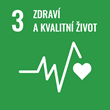
Informace o projektu
DIOSCURI Centre for Stem Cell Biology and Metabolic Diseases
- Kód projektu
- LV23007
- Období řešení
- 7/2024 - 6/2029
- Investor / Programový rámec / typ projektu
-
Ministerstvo školství, mládeže a tělovýchovy ČR
- DIOSCURI
- 1. výzva (2022)
- Fakulta / Pracoviště MU
- Přírodovědecká fakulta
The continued health of many of our organs, including the skeleton, relies on the function of specialized stem cells. These stem cells reside in niches that support their long-term maintenance. Disruption of the niche, for example due to aging, injury, or genetic mutations, can lead to declines in stem cells and a failure to maintain and repair tissues. Compared to the stem cells that maintain and repair our skeleton, we know much less about the cell types that constitute their niche. Here, I take an innovative single-cell genomics approach to characterize potential niche cells for the skeleton. I use the highly regenerative zebrafish as a model, due to the unrivalled genetic and imaging techniques for visualizing and manipulating stem cells in vivo. My large-scale genomics studies have uncovered a novel niche cell type for the skeleton. These niche cells express homologs of several genes underlying skeletal diseases in humans, particularly those affecting the skull: WNT5A, HGD, and PAH. I will leverage powerful genomic, genetic, and high-resolution imaging approaches to test that niche cells maintain skeletal stem cells through secretion of signaling factors such as Wnt5a. I will test that metabolism of phenylalanine in niche cells is critical for maintenance of skeletal stem cells, with defects in phenylalanine metabolism, outside the liver where it is normally thought to occur, damaging the skeleton. We will clarify how defects in the niche result in both developmental defects in the facial skeleton and a failure to maintain a healthy skeleton. Our findings may lead to future therapies aimed at restoring a normal skeleton through modulating the niche and its secreted factors. The mentorship plan outlined here were designed to lay the groundwork for my career goal of establishing strong multidisciplinary team with a variety of experiences and skill sets. I am enthusiastic about having Prof. Stefan Schulte-Merker, a director of Institute for Cardiovascular Organogenesis and Regeneration, as close collaborator. Prof. Schulte-Merker is highly inspiring personality and long-standing expert in zebrafish skeletal genetics with an excellent scientific as well as funding track record. We will share valuable animal lines, expertise in zebrafish bone diseases but especially I will benefit from his personal mentorship - to become a successful group leader.
Cíle udržitelného rozvoje
Masarykova univerzita se hlásí k cílům udržitelného rozvoje OSN, jejichž záměrem je do roku 2030 zlepšit podmínky a kvalitu života na naší planetě.


